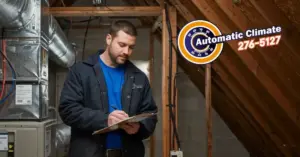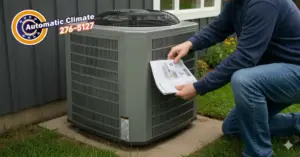Discover the Right Size HVAC System for Your Home in the Richmond!
Square Footage and Home Layout
The size of your home is a primary factor in determining the appropriate HVAC system size. Generally, you’ll need about 20 BTUs per square foot of living space[1]. However, the layout of your home also plays a crucial role. Open floor plans may require less cooling power than homes with multiple small rooms. For instance, a 2,000 square foot home with an open layout might need a 3-ton unit, while a similarly sized home with many separate rooms could require a 3.5-ton system[2].
Climate Considerations in the USA
The climate in Richmond, Virginia, with its hot, humid summers and moderately cold winters, significantly impacts HVAC sizing. Homes in this region typically require more cooling capacity than those in milder climates. For example, while a home in a cooler climate might need 30 BTUs per square foot, a similar home in Richmond could require up to 35-40 BTUs per square foot to maintain comfort during peak summer months[3].
Insulation and Energy Efficiency
The quality of your home’s insulation directly affects the size of HVAC system you need. Well-insulated homes retain conditioned air more effectively, potentially allowing for a smaller HVAC unit. Conversely, poorly insulated homes may require larger systems to compensate for heat loss or gain. Upgrading your insulation can potentially reduce your HVAC size needs by 10-20%[4].
Calculating Your HVAC Needs
Manual J Load Calculation
The Manual J load calculation is the industry standard for determining the correct HVAC size. This comprehensive assessment takes into account factors such as your home’s square footage, insulation levels, window placement, and local climate data. While online calculators can provide rough estimates, a professional HVAC technician should perform a detailed Manual J calculation for the most accurate sizing[5].
BTUs and Tonnage Explained
HVAC capacity is measured in British Thermal Units (BTUs) and tons. One ton of cooling capacity equals 12,000 BTUs per hour. For example, a 3-ton air conditioner can remove 36,000 BTUs of heat per hour. In Richmond’s climate, you might need approximately 1 ton of cooling for every 500-600 square feet of living space, depending on your home’s specific characteristics[6].
Common Mistakes to Avoid
Oversizing vs. Undersizing
Oversizing an HVAC system can lead to short cycling, where the unit turns on and off frequently, reducing efficiency and comfort. An oversized system may cool your home quickly but fail to properly dehumidify the air. Undersizing, on the other hand, can cause your system to run constantly, struggling to maintain comfortable temperatures. Both scenarios can lead to increased energy bills and premature system wear[7].
Ignoring Local Building Codes
Richmond, like many cities, has specific building codes that affect HVAC installation. These codes ensure safety and efficiency standards are met. Ignoring these regulations can result in fines, reduced home value, and potential safety hazards. Always work with a licensed HVAC professional familiar with local codes to ensure compliance[8].
Professional Assessment and Installation
Benefits of Hiring HVAC Experts
Professional HVAC technicians bring expertise and specialized tools to accurately size your system. They can perform a detailed home energy audit, identifying areas of heat loss or gain that might affect your HVAC needs. Additionally, professionals can recommend energy-efficient options that may qualify for rebates or tax incentives, potentially saving you money in the long run[9].
Energy Audits and Home Evaluations
A comprehensive energy audit can reveal inefficiencies in your home that impact HVAC sizing. This may include assessing air leaks, insulation quality, and ductwork condition. Addressing these issues before installing a new HVAC system can improve overall efficiency and potentially reduce the size of the unit needed, leading to long-term energy savings[10].
Energy-Efficient Options for American Homes
ENERGY STAR Ratings
ENERGY STAR certified HVAC systems are up to 15% more efficient than standard models. In Richmond’s climate, choosing an ENERGY STAR rated system can lead to significant energy savings. For example, an ENERGY STAR certified air conditioner could save you up to $115 per year on cooling costs compared to a standard model.
Smart HVAC Systems
Smart HVAC systems offer advanced features like learning thermostats and zone control, which can further optimize your home’s energy use. These systems can adapt to your lifestyle, automatically adjusting temperatures based on occupancy and preferences. In Richmond’s variable climate, a smart HVAC system can provide more precise temperature control and potentially reduce energy consumption by up to 20%.
Contact Us About Your Air Conditioning, Heating, Air Duct, Plumbing & Electrical Needs In Richmond Virginia & surrounding areas. Our Experts Are Just a Call Away!
Our service vehicles are always fully stocked with the parts you need to get your AC system back up and running. You can also reach your emergency line at night, during the weekends or on holidays!
Automatic Climate Inc.
5601 Biggs Rd. Richmond, VA 23224
(804) 803-1983
Estimates: [email protected]
Information: [email protected]
Additional Considerations for HVAC Sizing
Window Efficiency and Placement
The number, size, and quality of windows in your Richmond home can significantly impact your HVAC needs. Energy-efficient windows with low-E coatings can reduce heat gain in summer and heat loss in winter, potentially allowing for a smaller HVAC system. South-facing windows may increase cooling needs in summer, while large windows in general can affect the overall thermal envelope of your home.
Ceiling Height and Attic Space
Homes with high ceilings or vaulted spaces require more heating and cooling power. For instance, a room with a 10-foot ceiling may need up to 25% more cooling capacity than a similar room with standard 8-foot ceilings. Additionally, a well-insulated attic can act as a buffer against extreme temperatures, reducing the load on your HVAC system.
The Impact of Landscaping on HVAC Efficiency
Strategic landscaping can play a role in reducing your HVAC size requirements. Properly placed shade trees can lower cooling needs by up to 30% in some cases. In Richmond’s climate, deciduous trees on the south and west sides of your home can provide shade in summer while allowing beneficial sun exposure in winter.
Future-Proofing Your HVAC Investment
Anticipating Home Improvements
When sizing your HVAC system, consider any planned home improvements or additions. A system that’s perfectly sized for your current home may be inadequate if you’re planning to finish a basement or add a sunroom in the near future. Discussing your long-term plans with an HVAC professional can help ensure your system remains efficient for years to come.
Adapting to Climate Change
As Richmond experiences more extreme weather patterns due to climate change, your HVAC needs may evolve. Opting for a slightly more robust system or one with variable speed technology can provide flexibility to adapt to changing climate conditions over the lifespan of your HVAC unit.
Frequently Asked Questions: HVAC System Sizing for Richmond Homes
Q: How does square footage affect HVAC system size?
A: Generally, you need about 20 BTUs per square foot, but this can vary based on other factors like home layout and insulation.
Q: What is a Manual J Load Calculation?
A: It’s a comprehensive assessment that considers factors like square footage, insulation, window placement, and local climate to determine the correct HVAC size.
Q: How does Richmond’s climate impact HVAC sizing?
A: Richmond’s hot, humid summers and moderately cold winters typically require more cooling capacity, around 35-40 BTUs per square foot.
Q: What’s the difference between BTUs and tons in HVAC sizing?
A: One ton of cooling capacity equals 12,000 BTUs per hour. In Richmond, you might need 1 ton for every 500-600 square feet.
Q: How does insulation quality affect HVAC size?
A: Well-insulated homes retain conditioned air better, potentially allowing for a smaller HVAC unit. Poor insulation may require a larger system.
Q: What are the consequences of an oversized HVAC system?
A: Oversized systems can lead to short cycling, reduced efficiency, inadequate dehumidification, and increased energy bills.
Q: How do ENERGY STAR rated systems benefit homeowners?
A: ENERGY STAR systems are up to 15% more efficient, potentially saving Richmond homeowners up to $115 per year on cooling costs.
Q: How do windows affect HVAC sizing?
A: The number, size, and efficiency of windows impact heat gain and loss. Energy-efficient windows may allow for a smaller HVAC system.
Q: Can landscaping influence HVAC size requirements?
A: Yes, strategic landscaping with shade trees can reduce cooling needs by up to 30% in some cases.
Q: How do ceiling height and attic space affect HVAC sizing?
A: Higher ceilings require more cooling power. A well-insulated attic can reduce the load on your HVAC system.
Q: How important is ductwork in HVAC efficiency?
A: Crucial. Leaky or poorly insulated ducts can reduce system efficiency by up to 20%. Proper ductwork can allow for a smaller, more efficient HVAC system.
The Role of Ductwork in HVAC Efficiency
The condition and design of your ductwork are crucial factors in HVAC efficiency. Leaky or poorly insulated ducts can reduce system efficiency by up to 20%. When sizing your HVAC system, a professional should assess your ductwork to ensure it can handle the airflow of the new unit. In some cases, upgrading or redesigning ductwork may allow for a smaller, more efficient HVAC system.
Making an Informed Decision
Determining the right size HVAC system for your Richmond home involves careful consideration of multiple factors. From your home’s square footage and layout to its insulation quality and local climate conditions, each element plays a crucial role in the sizing equation. By working with a qualified HVAC professional and considering energy-efficient options, you can ensure your new system provides optimal comfort while maximizing energy savings.
Remember, the goal is not just to heat and cool your home effectively, but to do so efficiently. An appropriately sized HVAC system will maintain comfortable temperatures, manage humidity levels, and operate at peak efficiency, leading to lower energy bills and a reduced carbon footprint. Take the time to get it right, and you’ll enjoy the benefits of your well-sized HVAC system for years to come.
Next Steps: Consulting with Local Experts
To get started on finding the perfect HVAC system size for your Richmond home, consider reaching out to local HVAC professionals. They can provide a comprehensive assessment of your home’s needs, taking into account all the factors we’ve discussed. With their expertise and your newfound knowledge, you’ll be well-equipped to make an informed decision that ensures comfort, efficiency, and long-term satisfaction with your home’s heating and cooling system.
Hashtags
#HVACSize, #RichmondHVAC, #EnergyEfficiency, #HomeComfort, #HVACTips, #SmartHVAC, #HomeImprovement, #ClimateControl, #EnergyStarHVAC, #HVACExperts
Resource Links
Legal Disclaimer
This article is for general informational purposes only and should not be considered as professional advice. Every home’s HVAC needs are unique, and we strongly recommend consulting with a certified HVAC professional for accurate sizing and installation recommendations tailored to your specific situation.
Internal Linking
When considering the right size HVAC system for your Richmond home, it’s crucial to consult with experienced HVAC professionals who understand the local climate and building codes. Regular air conditioning maintenance and repair can also impact the efficiency of your system, potentially affecting the size you need. If you’re thinking about replacing your HVAC system, a professional assessment can help ensure you choose the perfect size for your home’s needs.
Exclusive Promotions and Coupons

$39 A/C
Tune-Up!
Take advantage of this limited time offer. Keep your home cool this summer with Automatic Climate!*
*Expires 12/30/25. Offer can’t be combined with other offers or promotions. Offer valid for existing and new clients.

$50 OFF Air
Duct Cleaning
Save $50 on your next air duct cleaning service for a limited time!*
*Expires 12/30/25. Offer can’t be combined with other offers or promotions. Offer valid for existing and new clients.

$49 Water
Heater Flush
Take advantage of this $49 water heater flush and make sure your water is heating properly!*
*Expires 12/30/25. Offer can’t be combined with other offers or promotions. Offer valid for existing and new clients.
EXCELLENTTrustindex verifies that the original source of the review is Google. Aaron J. Visited our home later this evening to follow up with today’s install and the system checked out as it should. The only issue we had was connecting and setting up the wireless thermostat due to the app issues. He was very professional and patient. John and Joe replaced our 2nd floor gas heating system in a professional manner. Everything went smooth according to them and they finished the job in less time than expected. Aaron was professional and extremely thorough during his visit to our home. He took the time to explain the workings of our HVAC system and answered every question. To add to the above, I called the office and spoke with both Austin and Jason who were also very helpful while explaining the warranty and transfer of same. We are extremely pleased with Automatic Climate and will highly recommend to anyone who may ask for recommendations.
Owner's reply
Thank you for sharing your positive experience! We're thrilled Aaron, Austin, and Jason could assist you so thoroughly. Your recommendation means a lot, and we're glad we could help with your HVAC system and warranty details.Posted onTrustindex verifies that the original source of the review is Google. I had a very positive experience with them. They had better financing options, better prices, and were more responsive than other companies I got quotes from. Michael Chris and the whole team were fantastic. Highly recommendPosted onTrustindex verifies that the original source of the review is Google. Technician was on time, personable and professional. He throughly explained everything that he was going to do and identified any concerns. Very pleased with the overall experience and would recommend to other homeownersPosted onTrustindex verifies that the original source of the review is Google. I had the coils cleaned in my tankless water heater. Aaron Jernigan was so seemingly competent, so well-mannered, so good explaining what was going on, I am considering switching to Automatic Climate, I will definitely have all the vents in my house blown out in the near future.Posted onTrustindex verifies that the original source of the review is Google. Fast, friendly, knowledgeable and professional. Their associate, Casey J, helped fix our heat when we were enduring 20-30 degree nights. Thank you so much!!Posted onTrustindex verifies that the original source of the review is Google. Charlie was very dedicated. Provided excellent service. Very impressed with his dedication. Did check on HVAC and cleaned drier vent in Condo we purchased last summer.Posted onTrustindex verifies that the original source of the review is Google. I've been a customer of Automatic Climate for several years. I value the services of this firm. My commitment to renewing my maintenance contract year after year is directly related to the technical expertise of one of the company’s many representatives, Antonio Diaz. Antonio has kept all three of my units running smoothly for years, and when necessary forewarns me early of any pending issues. He offers solutions right away without long waits for follow up. I've never had to call the company back to correct any of his work. Antonio attributes his success and extraordinary customer service to the culture of Automatic Climate. I would recommend Antonio and Automatic Climate to any of my friends and neighbors. They're a company you can trust.
Owner's reply
Thank you so much for your kind words! We're thrilled to hear you had a positive experience with our service.Posted onTrustindex verifies that the original source of the review is Google. John & Nick were here today to clean our air ducts. They were very thorough and made sure that they left our home as clean as when they arrived. They explained the process clearly and worked efficiently. Great job!Verified by TrustindexTrustindex verified badge is the Universal Symbol of Trust. Only the greatest companies can get the verified badge who has a review score above 4.5, based on customer reviews over the past 12 months. Read more








